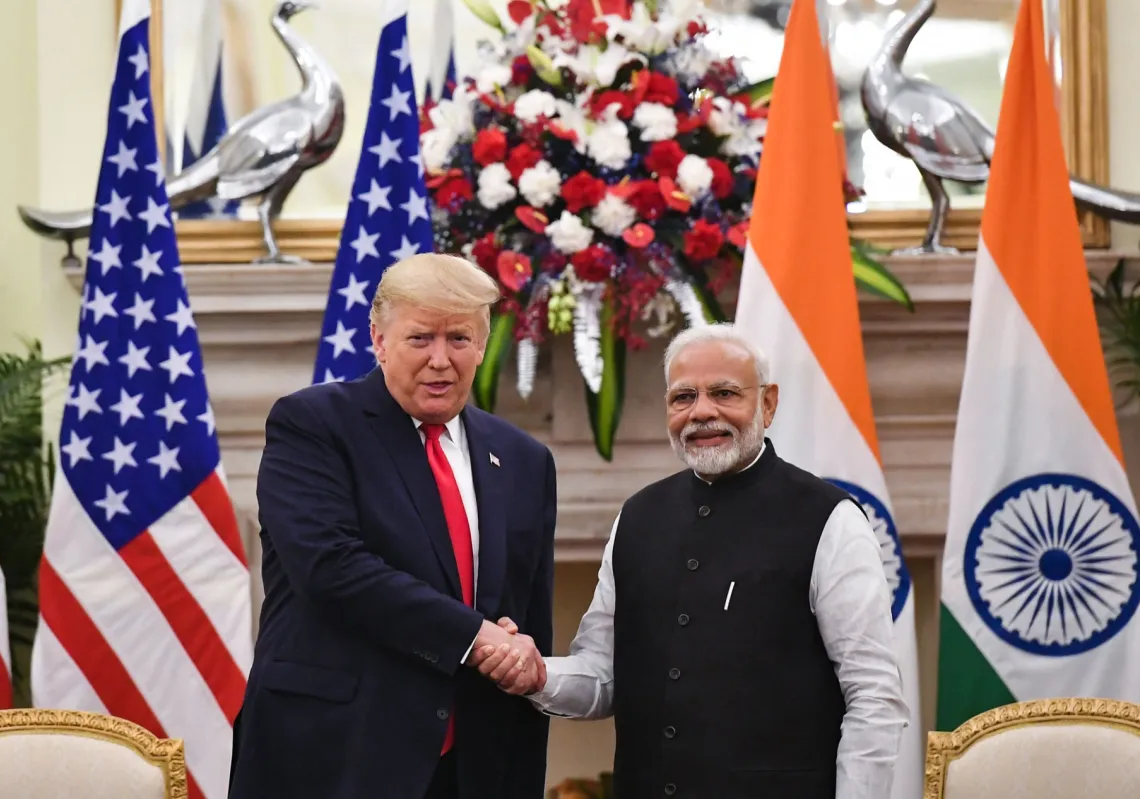On July 1, a few days after a woman in India registered for an account on the careers site Naukri.com and uploaded a resume, a recruiter called her: One of the country’s leading real-estate companies was hiring for a senior position, and more details would follow soon.
The woman had posted her details on the site, whose name means “job” in Hindi, because she feared losing her current role as a mechanical engineer. The coronavirus pandemic was in full swing, and India’s caseload was increasing fast. A brutal weeks-long lockdown had hammered businesses, throwing huge numbers of people out of work, with data later showing that in the three months immediately preceding the recruiter’s phone call, India’s economy had contracted by 23.9 percent. The national capital, New Delhi, where she lived, had been particularly badly affected.
Later that week, a human-resources manager at the real-estate company called, as promised. The job was hers, if she wanted it, and would begin the following month. All that was required was a show of commitment in the form of a security fee, which would be refunded once she started in her new role. The initial sum was 680,000 rupees, or about $9,200. Though such demands are rare in India, she was worried about losing her job, so she agreed, transferring the funds. Over the following days, the company asked for another deposit, to professionally verify her credentials and arrange for top-grade work equipment. This time it was 2.2 million rupees, or nearly $30,000. Throughout the conversation, she was assured that the money would be refunded. Once again, she paid.
Then the calls stopped. The HR manager could not be reached. The company was unresponsive. August, when she should have been starting, came and went, as did September. By this point it was clear that she had been scammed. Finally, on October 6, she went to the nearest police station.
Officers there, who shared the details of the case with me (the woman declined to be identified or interviewed), were sympathetic, but had few leads. Calls from the purported HR manager had been made over the internet, using a virtual private network to disguise their original source. The scammers had been impersonating executives at Naukri.com and the real-estate company and could not be found.
By following the bank-account transfers, the police were able to trace where the money had been sent, but again the answer was confounding. According to Ajit Kumar, an officer in the Delhi police department’s cybercrimes unit, the recipient bank account belonged to a 28-year-old security guard at a housing complex on the outskirts of New Delhi. When he was questioned by police, Kumar and other officers told me, the guard confessed that two years before, he had been approached by a man who had offered him a lucrative deal: All the guard had to do was lend his identity details for several new bank accounts to be opened in his name, and, for every withdrawal, he would get 10 percent of the amount taken. Kumar and his colleagues arrested the guard; he remains in custody but has yet to identify the person who made him the offer.
To some extent, the details of the incident are typical in a place like India: A raft of qualified and educated young people hop between companies in search of better pay and benefits, using sites like Naukri.com to advertise their talents, and some are scammed along the way, their only safety net an overburdened and under-resourced police force.
Yet the case also points to something else. India has been badly hit by COVID-19, with more confirmed cases than in any country besides the United States, and the economic impact has been severe. With large numbers of people who are reliant on daily labor to survive, and the persistent demands of an expanding middle class, the pressure for growth was enormous even before the pandemic began. COVID-19 has turned back the clock, reversing years of progress.
One sector has withstood the onslaught: the fake-jobs economy, a vicious wheel of desperation in which each human spoke—from those who make the calls offering nonexistent work, to those whose identities are stolen, to those who are bilked of their savings—is a tale of hardship.
Entering India’s professional class isn’t easy. The barriers are both diverse—caste, family background, gender, language, and religion, to name a few—and deep-rooted. The country’s education system is famously rigid and competitive, with top universities setting absurdly high entrance requirements, confident that they will still have an abundance of qualified applicants. Even those who make it that far have no guarantee of high-paying employment: India’s economy must generate millions of new jobs every year for its young and expanding population, but it perennially falls short. And there is no respite once people are gainfully employed, because a plethora of new job seekers are always on the way.
Still, since India’s economic liberalization in 1991, millions have managed to beat the odds, becoming sales executives and hotel supervisors, engineers and doctors, project managers and airline pilots. These individuals embody the tale the country likes to tell the world about its economic expansion over the past 30 years.
The coronavirus has dealt an enormous blow, however. India’s first lockdown, which began in late March, lasted several weeks and effectively shut down swaths of its economy. Hordes of informal workers rushed back to their home towns and villages, fleeing cities where there was no work left, and where they had no savings or assets to rely on. Many more state and local lockdowns would follow, each inflicting more economic damage.
As those restrictions have eased, and the economy has begun to open back up, poorer Indians in the informal economy are getting back to work at shops, factories, and restaurants. But the damage to the country’s formal sector, affecting nearly a third of non-farmworkers, is significant.
The mechanical engineer in New Delhi held on to her existing job, despite her worries. Between April and August, 21 million salaried workers did become unemployed, however, according to the Centre for Monitoring Indian Economy, a Mumbai-based research firm. There have been widespread reports of unemployed white-collar workers having to shift to worse-paid manual labor just to make ends meet. There appears to be little respite on the horizon: The International Monetary Fund has projected a 10.3 percent decline in the economy in the 2020–21 fiscal year. India’s own official estimates forecast a 7.7 percent contraction in gross domestic product, the biggest annual shrinkage since 1952. According to CMIE, even by the end of December, nearly 15 million fewer people were employed than at the start of the first lockdown. “Those who lost their jobs were concentrated in urban regions, among women, among the relatively younger workers, the graduates and post-graduates and the salaried employees,” Mahesh Vyas, CMIE’s managing director, wrote in a recent column for Business Standard.
India’s economy was on precarious footing before the pandemic struck, with growth failing to spur sufficient job creation or keep pace with developing what remains in parts a poor country. The pandemic has worsened that reality, unraveling dreams even for those lucky few who have made it through the gamut of the country’s education and employment demands.
This has left many people chasing employment wherever they can find it. Yet while real openings are hard to find, fake offers await them at every turn.
India’s job-fraud industry is neither new nor small, but its prospects have never looked brighter. I first reported on employment scams for the Hindustan Times several years ago, and have regularly followed up on new developments ever since. As part of this routine, I speak with scammers, victims, and investigators, survey employment ads and recruitment agencies, track down fake-job centers, follow complaint and confession forums, monitor social-media networks in which the scammers trade notes, and trace news reports. (Most of the fraudsters and victims request anonymity, either wanting to shield themselves from the authorities or fearing the embarrassment that comes from revealing that they have been preyed upon.) In 2017, a colleague and I put together a nationwide database of cases reported in news publications. In total, we compiled reported scams ensnaring 30,000 Indians in a single year—and that was just the number we found in English-language media. The variety was mind-boggling: from scams run by five people to those run across five cities; from uneducated workers conned out of $50 to elite professionals who lost a hundred times that; from fake jobs promised at nameless call centers to those being “sold” at India’s biggest tech companies.
I haven’t updated the database in a while, but over the past couple of years, job fraud has become a phenomenon I no longer find just in the news. Victims range from my own colleagues to complete strangers I meet on reporting trips. The methods keep changing, but the patterns remain the same: The harder it becomes to find real work, the easier it is to sell fake offers.
Right now, the conditions are ideal. Nonexistent jobs are being advertised across the Indian internet—on websites, messaging apps, social media, and even e-commerce portals. There is a fake job out there for everyone who is looking, from chief executives to clerks. Spotting one isn’t hard: The clues often lie in the ads themselves. Many of them stress “mass openings” and require “immediate joining,” offer lavish salaries and quick incentives, provide sketchy contact information, and contain no verifiable details. Some can be cleared up once a phone call is made, which usually ends up with the “employer” asking the job seeker to send money to secure the job. Others require a physical visit to an actual office where an applicant is faced with serious interviewers and, if they pass, an official contract. But again, they can’t show up to work until they have paid a security deposit. Of course, once they send the money, everything vanishes: people, phone numbers, physical addresses.
The official numbers for reported job frauds in 2020 won’t be known for months, but many police departments are recording a spurt. In Thiruvananthapuram, the capital of the southern state of Kerala, police registered 27 cases through July, and the police commissioner, Balram Kumar Upadhyaya, told reporters the scammers were specifically targeting those who had lost their jobs during the pandemic. The victims included one person who paid about $1,300 to secure a management job in Canada. According to Assistant Police Commissioner G. Shekhar, one police force in Hyderabad, in the center of India, recorded 69 cases through September, compared to 59 in all of 2019. Among them was a woman who paid more than $5,000 for a job at a multinational company, lured by a scammer who ran a fake-job website called Careersyte. In Delhi, police officers are confronting an explosion in fake-job portals and scam centers. In South Delhi, where the mechanical engineer taken for thousands of dollars lives, dozens of cases have come in since June, the assistant police commissioner, Eish Singhal, told me. In July, the capital’s police shut down several websites that faked government credentials to offer unemployment grants to the newly jobless under a state program that doesn’t exist.
Of course, these numbers are an underestimate. Only a fraction of schemes are covered by the press, and not every victim files a police complaint—many told me they were loath to spend long periods in police stations, and, thinking of the corruption-stained reputation of many of India’s forces, were worried that they would have to pay further bribes to try to get their original money back; officers, meanwhile, argued that they lacked even a fraction of the resources necessary to chase tip-offs, many of which led only to the arrest of relative small fry, such as the village security guard Kumar nabbed.
Instead, many of the victims post their experiences online, joining a community that exchanges tips, alerts, cautionary tales, and sob stories in YouTube comments and Quoraanswers. After Akanksha Panwar posted a YouTube video in May describing her sister-in-law’s job-fraud ordeal, dozens of people commented. “Only some of them are thanking me for alerting them to this scam,” she told me. “Most of them are saying that the same thing has already happened to them.”
Others recount stories from the other side, within the employment-fraud industry. In one YouTube video posted in July, high-school graduate Suhel Khan described the two months he spent right out of high school as a job scammer. For a little more than $100 a month, Khan posted dozens of fake-job ads every day on OLX, an Indian equivalent of eBay, from an office in Delhi. (He initially agreed to an interview, but later canceled, apparently fearful of being investigated by the authorities. His video, however, remains up.) Khan told viewers about how colleagues in a different room would answer calls from prospective job seekers, claiming to be HR managers for top-tier Indian companies such as the e-commerce giant Flipkart or the automotive behemoth Tata Motors and conducting interviews for nonexistent jobs. “No one failed these interviews regardless of the answers they gave,” he said. “Everyone got a job.” What followed were requests for security deposits, made more real by the dispatch of letters using fake letterhead and stamps of the companies in question, and then more requests for money, this time to pay for equipment. Khan said he quit after grasping the scale of the fraud, cautioning his viewers to heed his every word.
There are certainly malicious actors in this whole mess—people who know full well what role they are playing in defrauding others—and even those who have made peace with working in the overall industry, offering up nonexistent jobs to secure their own paycheck.
Yet in the years I have covered these scams, the persistent theme has been one of desperation: the desperation of the person who, offered an opportunity that is likely too good to be true, hands over their savings anyway, hoping to make a little more money; the desperation of the person who rents out his or her name and address for a tidy commission, looking to supplement an otherwise meager wage; the desperation of the call-center staffer hawking fake jobs, aiming to fulfill a white-collar dream. The scam jobs multiply so fast that few recruits stick to one beyond a few months. Some move on from selling fake jobs to selling fake loans within a week. All of these people have been failed by a system that, at multiple turns, has been found wanting.
In November, I called a phone number listed in a payment receipt distributed by the same Delhi placement agency, and asked the person at the other end of the line about its association with employment-fraud schemes. The man who responded introduced himself as Madhav Singh and told me he had recently left the agency (the number I had dialed was a cellphone).
“What you are saying is news to me,” Singh said, claiming that he had only worked at the agency for a couple months. Depressingly, he himself had fallen prey to multiple job scams, thereby losing thousands of rupees as he sought work during the pandemic. “I really needed the money.”
In speaking to Singh, the overriding theme of desperation came up once again. The frustration in his voice was evident—at one point, he said if I really cared about the issue, I should start an NGO to spread awareness, rather than just writing an article.
Then, before I hung up, he asked if I knew of any jobs available.









